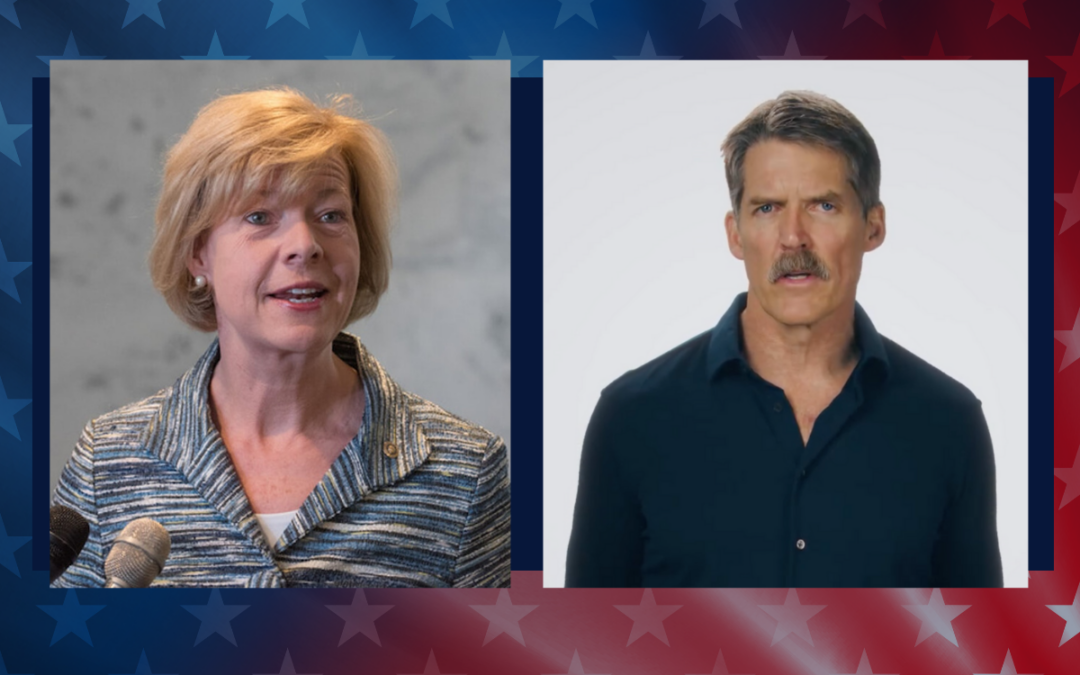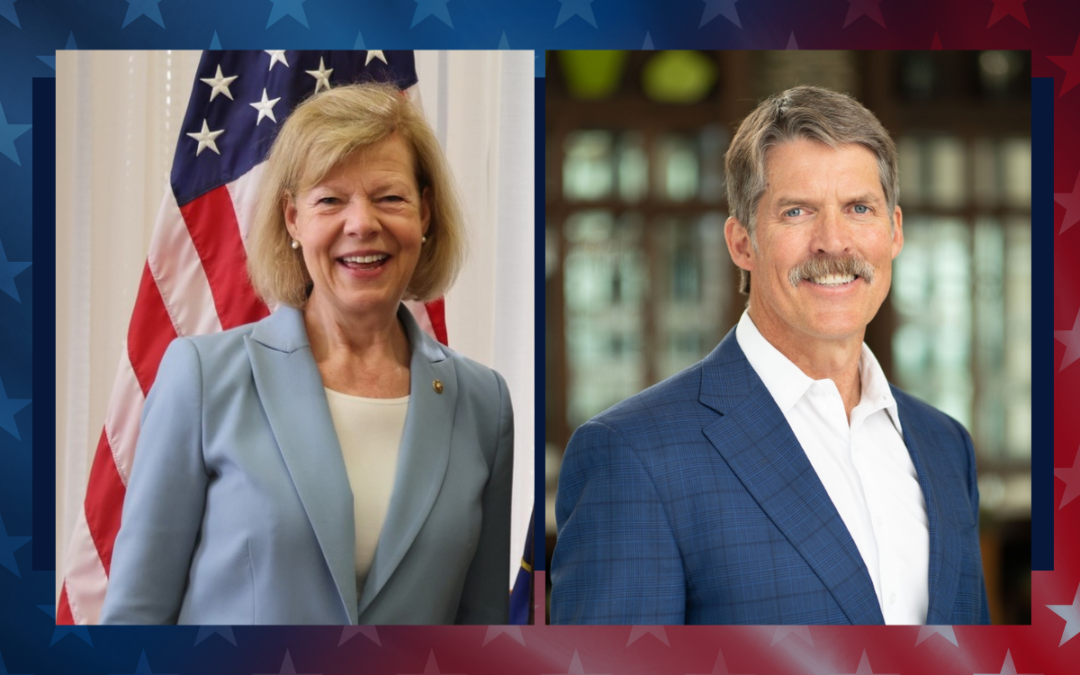
#image_title
#image_title
No state Supreme Court race this year, but tens of thousands of dollars and high-profile endorsements are flying in two down-ballot races in next week’s election.
The likes of former Gov. Scott Walker, likely Republican gubernatorial candidate Rebecca Kleefisch, and conservative megadonors Richard and Elizabeth Uihlein are leaving their marks on next week’s Appeals Court races, injecting a significant level of partisan politics and funding into what are officially nonpartisan elections.
This seepage of partisanship has been going on for years in higher court elections. But the rhetoric and funding is trickling down into lower races, a trend that is emblematic of the nation’s increasing political polarization and the ongoing right-wing effort to control the nation’s courts.
Visible partisanship in court races is not necessarily an inherently bad thing because it can in some ways help voters identify judges who align with their views, experts told UpNorthNews, but it nonetheless can tarnish the judicial branch’s reputation as fair and impartial.
“The idea of a nonpartisan judicial election has always been a bit of a fiction, but now it’s becoming more and more of a fiction,” said David Canon, a political science professor at UW-Madison.
In Appeals Court District 2, which includes 12 counties in southeastern Wisconsin, Muskego Municipal Court Judge Shelley Grogan is looking to unseat incumbent Judge Jeff Davis, a self-described judicial conservative and appointee of Gov. Tony Evers.
Grogan’s campaign donors and endorsements read like a list one might expect to see in next year’s midterm elections. She has received as much as $5,000 from big names like Kleefisch’s political action committee (PAC), the Wisconsin Realtors PAC, and former Attorney General Brad Schimel’s campaign. She has also drawn $12,900 from the Republican Party of Wisconsin and $5,000 contributions from the Uihleins and Beloit billionaire Diane Hendricks, owner of ABC Supply.
Grogan has raised about $310,000 this year, with $38,000 of that coming from interest groups.
Related: Big Business Group Runs Misleading Ad in State Supreme Court Race
Davis has raised about $65,000 from donations between 2020 and 2021, including $4,000 from the Democratic Party of Wisconsin. He has also taken out $500,000 in personal loans.
“While nonpartisan judicial races regularly witness partisan activity and campaigning, the current situation appears to be a continued trend of the increasing importance of partisanship in all aspects of society—from mask wearing to judicial vote choice,” Michael Hansen, an assistant political science professor at UW-Parkside, wrote in an email. “Further, the political parties continue to realize that control of the courts is just as powerful of a tool for achieving policy goals as is control of a legislature.”
On her campaign website, Grogan touts endorsements from Sen. Ron Johnson; Republican US Reps. Tom Tiffany, Mike Gallagher, Glenn Grothman, and Scott Fitzgerald; Walker; Pro-Life Wisconsin; Assembly Speaker Robin Vos (R-Rochester) and Senate Majority Leader Devin LeMahieu (R-Oostburg); and current state Supreme Court Justice Rebecca Bradley and former state Justice Dan Kelly.
Her campaign is managed by Walker’s son Alex.
“I don’t get why, in this particular race, Republicans decided to make this about partisanship,” Davis said in an interview. “Except for the fact that, No. 1, Scott Walker’s son is running her campaign—and that’s just the truth, so there could be some nepotism involved—and No. 2, we are unfortunately in a hyper-partisan environment these days.”
Grogan and Alex Walker did not respond to requests for comment about the contributors or slate of endorsements.
In her campaign statements, Grogan has targeted Davis for being appointed by Evers, calling him “handpicked” for the job, but the Milwaukee Journal Sentinel reported Grogan applied for the appointment as well—and had also unsuccessfully applied while Walker was governor. The Journal Sentinel reported Davis previously donated to former Democratic Gov. Jim Doyle and liberal Supreme Court Justice Rebecca Dallet.
Davis said he’s not sure why the fact Evers appointed him is relevant and maintained he isn’t aligned with any party. He does, however, tout endorsements from Republican state Sen. Alberta Darling (R-River Hills) and Wisconsin Supreme Court Chief Justice Pat Roggensack and Justice Annette Ziegler, both conservatives.
“I feel like maybe I was naive,” Davis said. “I didn’t get the memo that the governor who appoints you is supposed to matter in one of these races.”
Same Story Up North
A similar dynamic is playing out in Appeals District 3, which encompasses 35 of the state’s northern counties. The race there pits Wausau-based attorney Rick Cveykus against Outagamie Circuit Court Judge Greg Gill.
Cveykus’ campaign website highlights few endorsements from overtly partisan sources except for former Democratic state Rep. Mandy Wright and Republican Marathon County Sheriff Scott Parks. He is also endorsed by Citizen Action of Wisconsin and Wisconsin Justice Initiative Action, two progressive groups that are officially nonpartisan.
But Gill leans into his slate of conservative endorsements, including those from 19 county Republican parties, Kleefisch, Pro-Life Wisconsin, and Gallagher.
Gill has also received $5,000 contributions from Richard Uihlein and the Wisconsin Realtors PAC, $2,500 from Kleefisch’s PAC, and $1,000 from billionaire Menards owner and CEO John Menard.
Gill has raised about $180,000 between 2020 and 2021, including $7,600 from interest groups. Cveykus has raised just $22,000 between 2020 and 2021, including $760 from the Democratic Party of Wisconsin; he also took out $40,000 in personal loans.
“As the political parties get more involved, it’s gonna start forcing people more and more to sign up with a political party, because that’s the only way money’s gonna come in and the only way you can get your voice heard,” Cveykus said in an interview.
Gill did not respond to requests for comment.
‘Do we want to change our elections?’
It all begs the question: Why bother claiming these races are nonpartisan anymore?
“I think that’s a question that we as a state should think about,” Aaron Weinschenk, chair of UW-Green Bay’s political science department, wrote in an email. “If we know that such races are essentially partisan affairs, do we want to change our elections so that judicial elections are officially partisan (many states have partisan state supreme court elections, etc.)? Or, are we okay having elections that are nonpartisan but that are really actually very partisan?”
In analyzing Wisconsin Supreme Court races going back to 1996, Weinschenk found that partisan voting trends have sharply increased. Last year’s spring Supreme Court election that saw liberal Jill Karofsky unseat conservative incumbent Justice Dan Kelly displayed a nearly perfect correlation with how counties voted in the 2016 presidential election.
Weinschenk said that is likely less pronounced in lower-court races, but the trend still probably holds true in races with high-profile partisan endorsements. But naked partisanship can actually serve voters, experts said, because all judges carry internal biases, and revealing them simply provides more transparency before people get to the voting booth.
“Partisan elections for judges are not inherently bad,” Sara Benesh, chair of UW-Milwaukee’s political science department, wrote in an email. “They are more information-rich, and that could be a good thing. It makes us uncomfortable because it flies in the face of our expectations for judges, but perhaps our expectations are unrealistic.”
Transphobia in Brown County Circuit court race
Another judicial race that has taken a turn for the ugly pits Assistant Green Bay City Attorney Rachael Maes against incumbent Judge Kendall Kelley for a circuit court seat.
Maes, who is transgender, has been the subject of transphobic attacks. A self-proclaimed conservative “patriots” group called “NEW [Northeastern Wisconsin] Patriots” that backs Kelley sent two emails in which the group deadnamed Maes—referring to her as her pre-transition name—according to The NEWComer, a newsletter covering northeastern Wisconsin.
Kelley also refused to participate alongside Maes in a candidate forum hosted by the League of Women Voters, NEWComer reported.
A pro-Kelley political mailer, a photo of which was provided to UpNorthNews, misgendered Maes and claimed she “asked the City of Green Bay taxpayers to pay for [her] gender transition,” referring to an Instagram post in which she wrote about how she got “sex transformation” removed from the city health plan’s exclusion list. The mailer was paid for by the “Wisconsinsites for Liberty Fund,” a new group whose treasurer is a former treasurer for a conservative superPAC, according to the Wisconsin Democracy Campaign.
The mailer calls Maes “radical” and says she “has an extreme plan for the Brown County Court.” It refers to Kelley as “The Law & Order Candidate” who will keep Brown County “a safe place for all our families.”
The spring election is Tuesday, April 6.
Politics

What’s the difference between Eric Hovde and Sen. Tammy Baldwin on the issues?
The Democratic incumbent will point to specific accomplishments while the Republican challenger will outline general concerns he would address....

Who Is Tammy Baldwin?
Getting to know the contenders for this November’s US Senate election. [Editor’s Note: Part of a series that profiles the candidates and issues in...
Local News

Stop and smell these native Wisconsin flowers this Earth Day
Spring has sprung — and here in Wisconsin, the signs are everywhere! From warmer weather and longer days to birds returning to your backyard trees....

Your guide to the 2024 Blue Ox Music Festival in Eau Claire
Eau Claire and art go hand in hand. The city is home to a multitude of sculptures, murals, and music events — including several annual showcases,...


